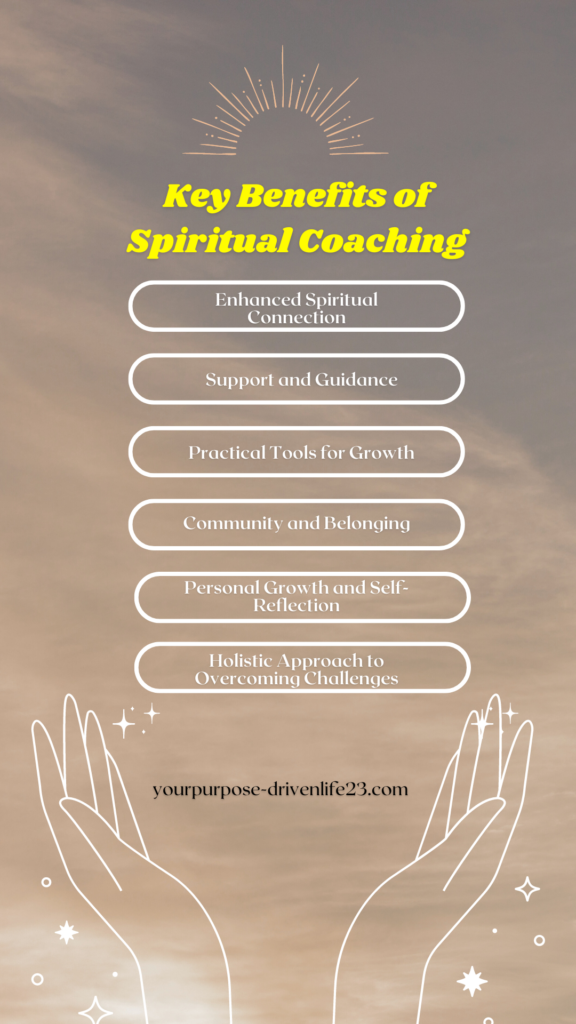What is a spiritual coach?
A spiritual coach is a trained professional who helps individuals find and connect with their inner self, spirituality, and purpose in life. Unlike traditional coaches, who focus on personal growth and development, spiritual coaches primarily help people explore their beliefs, values, and emotions to better understand their lives.
What is Spiritual Coaching?
Spiritual coaching is about fostering a deep connection between an individual and their spiritual beliefs or inner wisdom. This connection is cultivated through mentorship and various practical techniques, with the aim of unlocking a person’s full potential and guiding them towards realizing their life’s purpose and actual values.
It is highly personalized, reflecting the unique spiritual needs and paths of each individual. Coaches employ a range of strategies—borrowing elements from different spiritual traditions and incorporating practices such as mindfulness, meditation, and contemplative reflection—to support clients in their spiritual growth and discovery. It is a holistic approach that combines elements of spirituality, psychology, and self-discovery to help individuals lead more fulfilling lives.
The Role of a Spiritual Coach
A spiritual coach serves as a mentor, facilitator, and guide on an individual’s spiritual journey. They provide a safe and non-judgmental space for individuals to explore their thoughts, beliefs, and emotions. Spiritual coaches also use various techniques such as meditation, visualization, and mindfulness to help individuals tap into their inner wisdom and find clarity.
One prominent role of a spiritual coach is to ask thought-provoking questions that encourage individuals to reflect on their lives and beliefs. Spiritual coaches also help individuals identify patterns and behaviors that may be holding them back from achieving their full potential.
What does a spiritual coach do?
A spiritual coach is an individual devoted to helping others explore and express their inner spiritual life. Unlike traditional life coaches, spiritual coaches deeply value the connection to something greater than ourselves. This connection is often the center of the coach’s practice, with a focus on intuition, mindfulness, and self-awareness.
A spiritual coach supports clients in various ways, such as:
- Clarifying their spiritual needs and goals.
- Tapping into their intuition and heart-centered wisdom.
- Exploring different spiritual practices and traditions.
- Providing support and guidance in moments of spiritual crisis.
- Creating a safe and sacred space for deep reflection and transformation.
Types of Spiritual Coaches
There are various types of Spiritual Coaches. Some other possible specializations of spiritual coaches include:
Intuitive Coaches
Intuitive coaches use their intuitive abilities to guide individuals toward a deeper understanding of themselves and their intuition. They help individuals trust and develop their own inner guidance, leading to increased self-awareness and decision-making skills.
Life Purpose Coaches
Life purpose coaches help individuals discover and fulfill their unique life purpose or mission. They support individuals in identifying their passions, values, and strengths and aligning them with their goals and actions.
Mindset Coaches
Mindset coaches focus on shifting negative thought patterns and limiting beliefs to create a more positive mindset. They work with individuals to cultivate self-compassion, self-acceptance, and a growth-oriented mindset, leading to increased confidence and resilience.
Spiritual Psychologists
Spiritual psychologists combine spiritual principles with traditional psychological techniques to support individuals in their personal development. They address issues related to emotional well-being, relationships, and personal growth from a holistic perspective.
Working with these different types of spiritual coaches can have various benefits that support personal growth and transformation.
Key Benefits of Spiritual Coaching
The impact of spiritual coaching extends far beyond the session itself, imparting lasting benefits that can profoundly transform an individual’s life. Here are some of the key advantages:
Enhanced Spiritual Connection
Spiritual coaching deepens your relationship with your spiritual self, illuminating your understanding of your core values and life’s purpose. This heightened awareness fosters a sense of direction and fulfillment, offering clarity in life’s complex decisions.

Support and Guidance
Navigating the path of spiritual growth can be challenging, filled with obstacles and moments of doubt. Spiritual coaches provide invaluable support and guidance, helping individuals to overcome these hurdles and continue advancing on their spiritual path.
Practical Tools for Growth
By offering practical techniques such as meditation and mindfulness, spiritual coaching equips individuals with the tools they need for ongoing spiritual development, fostering a practice that can grow and evolve.
Community and Belonging
Spiritual coaching often takes place within group settings, creating a powerful sense of community and belonging among participants. This shared experience can be incredibly supportive, offering reassurance and encouragement from those on similar journeys.
Personal Growth and Self-Reflection
One of the most profound benefits of spiritual coaching is the encouragement of self-reflection and personal growth. Through introspection and spiritual practice, individuals learn to shed limiting beliefs, face personal obstacles head-on, and ultimately lead more meaningful and fulfilling lives.
Holistic Approach to Overcoming Challenges
Spiritual coaching embraces a holistic perspective, considering the interconnectedness of mind, body, and spirit in overcoming personal challenges and mental blocks. This comprehensive approach can lead to more sustainable and impactful transformations.
Cultivating the Necessary Skills
To be an effective spiritual coach, you need to cultivate a unique set of skills. These include:
Active Listening and Empathy
Empathy is the ability to understand and share another person’s feelings. A spiritual coach needs to develop a strong sense of empathy to connect with clients on a deep, emotional level effectively.
Intuition and Spiritual Awareness
An aptitude for spiritual awareness, alongside a sharpened intuition, is crucial for guiding clients through their journey. You must trust your instincts while helping others tap into their uncharted spiritual territories.
Effective Communication
Clear, compassionate communication is paramount. You’ll be discussing complex and sensitive topics, requiring you to articulate your thoughts and ideas professionally and considerately.
Establishing Boundaries
One of the most critical skills is the ability to create and maintain boundaries. This includes knowing your limitations as a coach and being able to step back when necessary to avoid becoming overly involved in a client’s spiritual quest.
Continuous Learning
Spiritual wisdom is deep and varied, with many perspectives and traditions. As a spiritual coach, you should be committed to lifelong learning, exploring different practices and incorporating new knowledge to benefit your clients.
Education and Training
Unlike counseling or therapy, spiritual coaching is not often a regulated field. However, education and training are still vital for honing your skills. Possible pathways include:
Spiritual Retreats and Workshops
Participate in retreats and workshops that align with your areas of interest. This experiential learning can provide invaluable hands-on experience and networking opportunities within spiritual communities.
Mentorship Programs
Seek out a mentor who is well-established in the spiritual coaching field. Learning directly from someone with expertise can fast-track your development as a spiritual coach.
Certifications
While not a necessity, obtaining a certification in spiritual coaching can enhance your credibility and demonstrate your commitment to the field. Many programs, both in-person and online, are offered by reputable institutions and professionals.
Higher Education
Consider pursuing a degree in fields related to spirituality, such as theology, philosophy, or even psychology. This academic approach can provide a solid foundation of knowledge and understanding.
Crafting Your Methodology
Developing your coaching methodology is an intricate process that evolves. This involves:
Defining Your Approach
Will you focus on a particular spiritual tradition, or will you adopt an eclectic approach? Determine the main components of your practice that will guide your coaching sessions.
Designing Your Sessions
Create a structure for your coaching sessions that will guide you and your clients through the coaching process. This could include meditation practices, discussion topics, or homework assignments to complete between sessions.
Personal Development
Before helping others in their spiritual growth, it’s crucial to continue your personal development. Regular self-reflection and spiritual practices will not only enrich your life but also provide insight and empathy that you can share with your clients.
Case Studies and Practicum
Work with volunteer clients or create case studies based on your hypothetical client interactions. This practical experience will help you fine-tune your methodology and approach.
Starting Your Practice
Once you’re adequately prepared, it’s time to launch your spiritual coaching practice. This includes:
Business Setup
Decide on the legal structure for your practice, secure any necessary licenses, and establish a business plan. This plan should include marketing strategies, target audience identification, and financial considerations.
Building Client Base
Networking within spiritual and wellness communities can be an excellent way to start getting clients. Leverage social media, create a website, and consider speaking engagements or hosting workshops to showcase your expertise.
Providing a Safe Space
Ensure that you create a safe and non-judgmental environment for your clients. This involves not only the physical space but also the emotional and energetic space.
Self-Care
Spiritual coaching can have profound emotional demands. Self-care, boundaries, and seeking support when needed are critical to maintaining spiritual and emotional well-being.
Continuing Professional Development
The field of spiritual coaching is dynamic, and there’s always something new to learn. Engaging in ongoing professional development is vital to staying current and continually improving your practice.
Further Education
This could involve obtaining additional certifications, attending advanced training programs, or pursuing higher education.
Community Engagement
Participate in spiritual communities, whether in-person or online, to stay connected and to continue learning and growing with others in the field.
Supervision and Peer Coaching
Seeking supervision or engaging in peer coaching can provide fresh perspectives on your coaching approach and help you develop new strategies through collaborative learning.

How Can a Spiritual Coach Help You?
A spiritual coach can help you in many ways, such as:
- Uncovering your purpose and meaning in life.
- Enhancing self-awareness and developing a deeper understanding of yourself.
- Strengthening your connection with your spirituality and inner wisdom.
- Building resilience and coping strategies to navigate challenges in life.
- Improving personal relationships and communication skills.
- Finding a sense of balance, peace, and fulfillment in life.
Who needs a spiritual coach?
Spiritual coaching is not limited to individuals who follow a particular religion or belief system. It is open to anyone who is seeking guidance, clarity, and inner growth. People from all walks of life can benefit from spiritual coaching, including those who:
- Feel lost or disconnected in their personal or professional lives.
- Struggle with self-doubt, low self-esteem, or lack of direction.
- Want to deepen their spirituality and explore new beliefs and practices.
- Are going through a significant life transition or facing challenges, such as grief, trauma, or anxiety.
- Want to improve their overall well-being and lead a more purposeful life.
Will a spiritual coach change my life?
Engaging with a spiritual coach has the potential to transform your life significantly. This transformation occurs as you begin to explore and understand the deeper aspects of your being. A spiritual coach acts as a catalyst for this change, guiding you through self-reflection, helping to illuminate your path of self-discovery, and supporting you in living more authentically. They facilitate a deeper connection with your inner values and beliefs, empowering you to align your external life with your true self.
This alignment can lead to profound changes in how you perceive yourself, how you relate to others, and how you interact with the world. Ultimately, the impact of a spiritual coach hinges on your willingness to engage in the process and apply the insights and practices you encounter. If you’re open to exploring your spirituality and committed to personal growth, a spiritual coach can indeed be a transformative presence in your life.
Is Spiritual Coaching Right for me?
Deciding whether spiritual coaching is the right path for you involves a deep inner exploration of your values, beliefs, and the goals you wish to achieve. If you find yourself seeking a deeper meaning in life, hoping to enhance your connection with your inner self, or navigating through a significant life transition, then spiritual coaching could offer the guidance and support you need. It’s designed not just for those in spiritual practices but for anyone looking to foster a greater sense of purpose, peace, and fulfillment in their lives.
As we continue to evolve and grow as individuals, it’s natural to seek out ways to enhance our personal growth and development. Spiritual coaching can assist in this journey by guiding us to connect with our inner wisdom and align our actions with our values and goals.
Through spiritual coaching, you can gain a deeper understanding of yourself and your place in the world. It may involve exploring your beliefs, values, and purpose in life, as well as examining patterns and behaviors that may be holding you back from reaching your full potential.
Spiritual coaching can also positively impact personal growth and relationships with others. By fostering a deeper understanding of ourselves, we can better empathize and connect with those around us.
Conclusion
Spiritual coaching is a powerful tool for self-discovery, personal growth, and spiritual connection. It offers everyone the chance to find their inner world, gain clarity, and find meaning in their lives. If you are on a journey of self-discovery and seeking guidance, consider working with a spiritual coach to support you along the way. Remember, your spirituality is unique and personal.

Be the first to comment